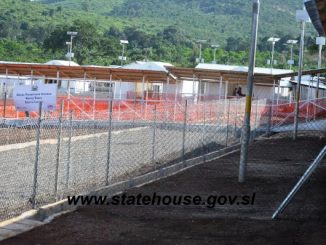
VIOLENCE AGAINST WOMEN AND GIRLS IS ROOTED IN GENDER -BASED DISCRIMINATION AND SOCIAL NORMS”
_…ALIE KABBA
The Sierra Leone’s Permanent Representative to the United Nations, Dr. Alie Kabbah has said violence against women and girls remains pervasive across the world, despite significant efforts to recognize, eliminate, and prevent it in all forms.
Dr. Alie Kabbah who is also the President of the Bureau of UN- Women Executive Board, and Member of the Gender Advisory Group of the President of the General Assembly made this remarks on Tuesday, 23rd March, 2021 during the Special Event on Political Leadership and Violence Against Women and Girls.

He said violence against women and girls was rooted in gender-based discrimination, social norms that accept violence, and gender stereotypes that continue cycles of violence adding that UN-Women has noted that efforts to eliminate violence against women and girls have mainly focused on responding to and providing services for survivors of violence.
“Violence against women and girls remains pervasive across the world, despite significant efforts to recognize, eliminate, and prevent it in all its forms. Two weeks ago, on International Women’s Day, WHO released new data highlighting that one in three women worldwide experience physical or sexual violence across their lifetime – a number that has remained largely unchanged over the past decade”. he stated.
Dr. Alie Kabbah continued that “While the numbers reveal already alarmingly high rates of violence against women and girls, they do not reflect the ongoing impact of the COVID-19 pandemic since the report is based on data from 2000 to 2018. UN-Women has reported that the COVID-19 pandemic has only further increased women’s exposure to violence, as a result of measures such as lockdowns and disruptions to vital support services – therefore triggering a shadow pandemic of increased reported violence of all kinds against women and girls.”
Dr. Alie went on to reveal recent research by UN-Women that identified additional prevention measures including developing sound gender-transformative policies as well as strengthening the national health system response to ensure access to survivor-centered care, challenging discriminatory attitudes and beliefs.
The research also revealed investing in sustainable and effective evidence-based prevention strategies at local, national, regional and global levels among others.
“Your Excellencies, distinguished delegates, ladies and gentlemen,
Thank you for inviting me in my capacity as President of UN-Women’s Executive Board to speak at today’s Special Event. I’m honored to be here to discuss the importance of political leadership to prevent violence against women and girls and share how the UN can support women’s leadership on the ground”. Dr. Kabbah spoke.
The Secretary-General’s report for this year’s CSW session further underlines that violence against women in public life is a major deterrent to their political participation and affects women of all ages, all ranks, and in every part of the world.
The report suggests more should be done to criminalize violence against women in politics, to improve the protection of victims, to build the capacity of State institutions and law enforcement bodies to apply laws and respond to incidents to strengthen judicial and complaints mechanisms to collect and monitor data on incidence and prevalence.
It set standards on what constitutes online violence against women in public life so that the media and companies running social media platforms can be held accountable for such content. “Only with such interventions and increased political commitments can we address gender-based violence, support women’s representation and achieve gender equality and the Sustainable Development Goals,” he concluded.



